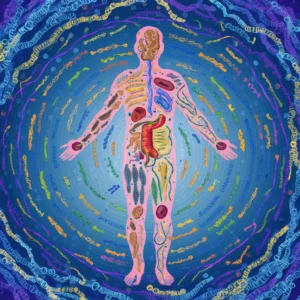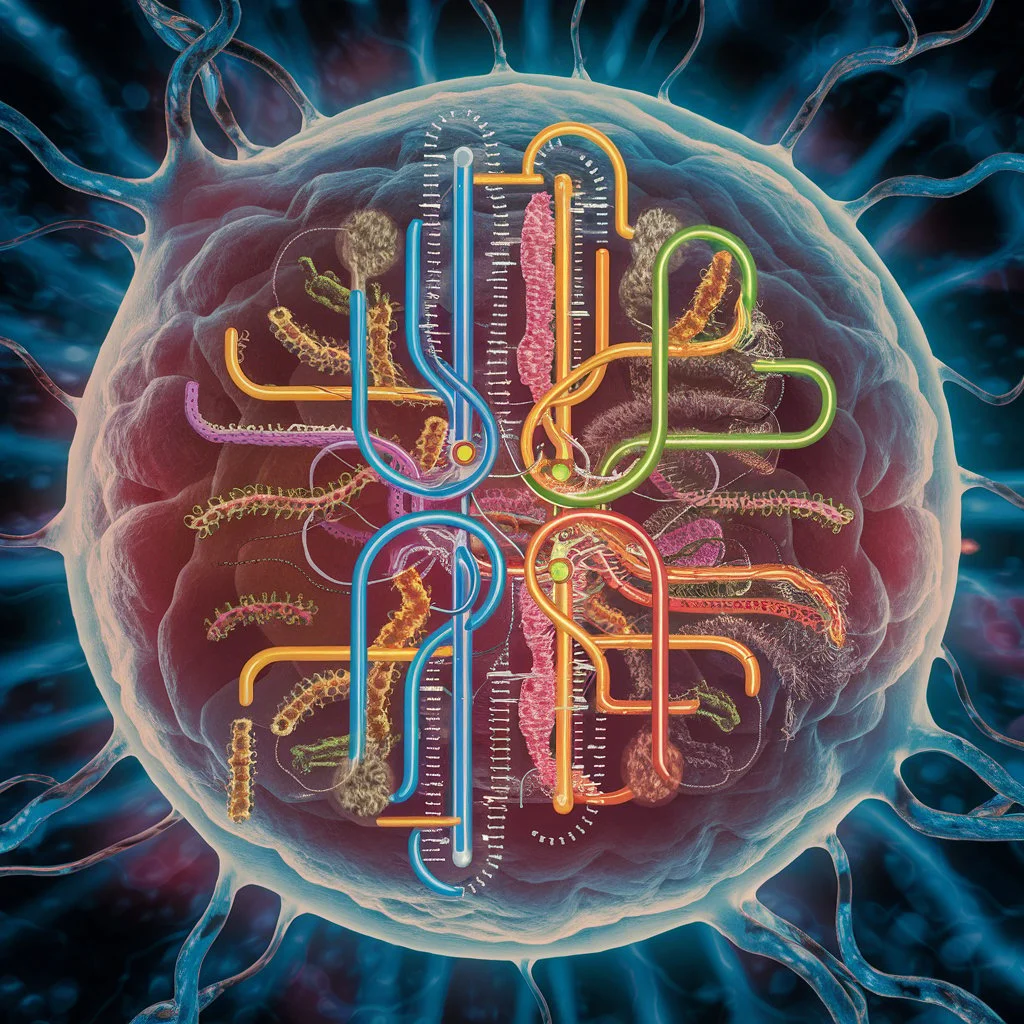Welcome to the fascinating realm of the human microbiome, where your health and well-being are being subtly shaped by billions of microbes! Imagine living things all about you, including bacteria, viruses, fungus, and other microscopic creatures. These little friends are essential for everything from immunological response to mood control to digestion. Our blog article,an invites you to join us on an illuminating exploration of the intricate workings of these microscopic ecosystems via state-of-the-art research. Prepare to learn how taking care of your microbiota may provide a wealth of health and mental advantages. Come explore this unexplored area with us as we uncover the secrets to increased lifespan, happiness, and health!
1.Overview of the Human Microbiome
Trillions of microorganisms reside in our bodies; they constitute a hidden world that is essential to our general health. This intricate ecology, which includes bacteria, fungus, viruses, and other microorganisms, is referred to as the human microbiome. Even while many individuals might not give these microscopic dwellers much thought on a daily basis, they have a huge influence on everything from immune system function to digestion.
Come explore the amazing realm of the human microbiome with us, learning about its definition, importance, and ways to cultivate a rich microbial environment for improved health and wellbeing.
The Microbiome: What Is It?
The large population of microorganisms that live within our bodies is referred to as the microbiome. These microscopic organisms include viruses, bacteria, fungus, and other microorganisms. The lips, skin, and stomach are among the most common locations for them.
Every person has a different microbiome. It’s influenced by things like lifestyle decisions, nutrition, environment, and heredity. The way that these microbes interact with human bodies is greatly influenced by their variety.
Although microbes are tiny, they have a huge impact. They generate vitamins, facilitate better digestion, and even support immune system regulation. The state of our microbiome has a big influence on our general wellbeing.
Comprehending the components of the microbiome facilitates the investigation of its possible advantages for human well-being. We are learning more about this amazing ecosystem that is inside of us as science progresses.
What Makes It Important?
The microbiome of humans is an essential component of our general health and welfare. Trillions of microorganisms, including bacteria, viruses, fungus, and archaea, make up this creature. These microscopic residents actively affect a number of physiological processes; they are not only passive residents.
By assisting in the breakdown of complex carbohydrates and the synthesis of vital nutrients, a healthy microbiome promotes better digestion. Maintaining nutritional health and energy levels depends on this mechanism.
Additionally, gut microbes interact with our immune system. They support immune response regulation, enabling the body to properly fight off infections while preventing needless inflammation.
The microbiota is also linked to mental health. Recent studies indicate that gut microbiota may influence mood and cognitive abilities via the gut-brain axis.
Knowing this complex link highlights why taking care of our microbial friends improves our physical and emotional well-being.
The Gut Bacteria’s Function in Human Health

The microbes in our stomach are essential to preserving general health. These microscopic creatures have an impact on immunological function, nutrition absorption, and digestion.
Fighting dangerous infections can be aided by a varied microbiome. It serves as a barrier, warding off illnesses and fostering immunity to infections.
Additionally, gut bacteria generate important vitamins, such as K2 and B12. Additionally, they produce short-chain fatty acids, which support the colon’s cells. In order to lower inflammation and promote metabolic health, this procedure is essential.
Recent studies suggest that gut microorganisms may also have an effect on mental health. Given the link between the gut and the brain, it is possible that these microbes have an impact on mood disorders including sadness and anxiety.
It’s critical that healthy and harmful bacteria coexist in equilibrium. An imbalance can result in inflammation throughout the body or digestive problems, which highlights the need of taking good care of our microbial friends Elements that
Numerous elements are vital in forming our microbiota. Among the most important factors is diet. Benefiting bacteria may be fostered by eating a wide variety of fruits, vegetables, and healthy grains.
Conversely, processed and high-sugar diets have the potential to upset this delicate equilibrium.
Antibiotics have a significant effect as well. Although they are vital for combating infections, they have the ability to indiscriminately eradicate both beneficial and dangerous microorganisms.
Lifestyle decisions are important as well. Stress can have a significant impact on gut health, yet regular exercise encourages variety in microbial populations.
Environmental influences are also important to consider. diverse childhood settings frequently result in diverse microbiota compositions as adults.
Finally, age has a role. As we age, changes in our food, lifestyle, and immune systems cause our microbiomes to shift over time. Our microbial buddies face fresh obstacles and possibilities at every level.
-
How to Keep Your Microbiome Healthy
For general health, a healthy microbiome must be maintained. To begin, broaden your diet to include a variety of foods. Probiotics and prebiotics are abundant in fruits, vegetables, whole grains, and fermented foods like kimchi and yogurt.
Additionally, staying hydrated is vital. Getting enough water aids gut health by nourishing good microorganisms. Steer clear of processed meals and high sugar content since they might upset the delicate balance of microorganisms.
Engaging in regular physical exercise also benefits your microbiota. Improved gut microbial diversity is associated with improved health outcomes and can be achieved by exercise.
Finally, employ stress-reduction techniques like yoga or meditation. Prolonged stress can harm your gut flora and cause a number of health problems. You may easily foster your body’s microbial companions by consciously choosing these foods on a regular basis.
Typical Myths Regarding the Microbiome
It is a common misconception that all germs are bad, however this couldn’t be further from the reality. In actuality, beneficial bacteria that are vital to immunological and digestive processes make up a sizable component of our microbiome. Another myth is that an unbalanced microbiota can only be corrected with probiotics. These vitamins don’t work like magic, but they can be helpful. A varied, high-fiber diet is essential to supporting a thriving microbial population.
Some people think that eating less junk food is the only way to preserve intestinal health. However, our microbial balance is also significantly impacted by antibiotic usage, stress, and sleep habits.
Finally, a common misconception is that the microbiome never changes. Actually, it is dynamic and varies according on a number of circumstances, such as exposure to the environment or lifestyle decisions. Comprehending these subtleties aids in simplifying the intricate bond we have with our microbes.
Current Studies and Findings Regarding the Human Microbiome
Fascinating new information on the impact of the human microbiome on health has been revealed by recent studies. Its complex relationship to mental health is now being investigated by researchers, who hypothesize that gut bacteria may be involved in mood regulation and cognitive function.
Technological advancements have simplified the analysis of microbial populations. Scientists are now able to identify individual bacterial strains and their roles in the gut ecology thanks to sophisticated sequencing techniques. This has made it possible to use individual microbiome-based customized medicine techniques.
The influence of food on microbial diversity is an important finding. Good bacteria thrive in an environment rich in fiber, but processed meals can reduce the diversity of these bacteria.
Moreover, recent studies suggest that the microbiome may be related to disorders including obesity and autoimmune illnesses. Understanding these intricate relationships will be crucial as more information is gathered in order to create targeted treatments that are specific to the microbial environment of each individual.
In conclusion, let’s embrace and care for our microbial allies.
Living in harmony with our microbiota can make our lives healthier and more energetic. A complex interaction between humans and these microscopic creatures that live within our bodies.Being aware of this link enables us to choose healthier lifestyles.
The microbes in our stomach are essential for proper digestion, immunity, and even mental wellness. We may recognize the need for balance within our microbiome by acknowledging their significance. Modest dietary adjustments, such as adding fermented foods or fruits and vegetables high in prebiotics, can have a big impact.
It’s also critical to be aware of the things that might upset this delicate ecosystem: stress, a bad diet, and abuse of antibiotics can all pose a threat to the healthy communities that reside in our intestines. Education is essential; dispelling popular myths paves the road for adopting healthy behaviors.
The most recent studies are revealing amazing new information on how our microbiome affects our general state of wellbeing. As scientists learn more about this intricate world, it becomes evident that maintaining a healthy habitat is crucial to the long-term viability of these microbes.
Accompanying the continuous education on the influence of the human microbiome on health, accepting these small allies creates new opportunities to improve quality of life. We should be proactive in fostering them since they have a big impact on who we are now and might become in the future.

